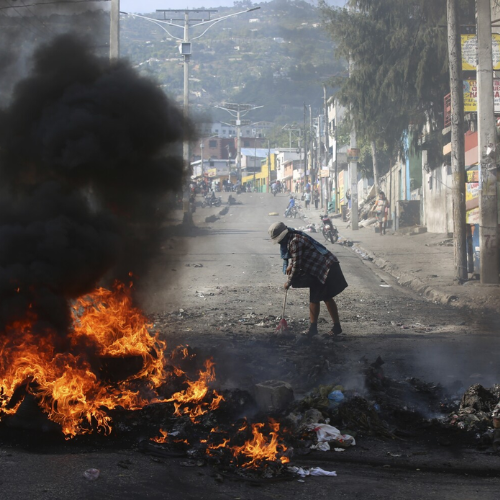The United States government has officially called two powerful Haitian gangs “foreign terrorist organisations.” These gangs, named Viv Ansanm and Gran Grif, have been blamed for causing chaos and violence in Haiti, especially in its capital city, Port-au-Prince. By giving them this label, the US aims to make it harder for these gangs to get help or resources.
This move fits into a larger pattern where the US government has been taking a tough stance against violent groups in Latin America. Recently, other gangs and criminal groups, including some from Mexico and Central America, have also been labelled as terrorists. The goal is to stop them from spreading violence and to protect US interests, including stopping the flow of drugs and illegal immigration into the country.
By calling these gangs terrorist organisations, the US can block their members from entering the country. It also makes it illegal for anyone to provide them with money, weapons, or other support. However, experts warn that this new rule could hurt regular people in Haiti. Many areas controlled by these gangs also control local businesses and even the movement of food and medicine. Now, people and organisations trying to help Haitians might face legal trouble if they have to deal with these gangs to get supplies through.
Mexico Furious Over U.S. Terrorist Label on Cartels, Warns of Dangerous Intervention
Gangs Tighten Their Grip on Haiti
The situation in Haiti has been getting worse in recent years. After the country’s president was assassinated in 2021, there was no election to choose a new leader. This created a power vacuum, and the gangs quickly took advantage of it. Now, they control large parts of Port-au-Prince — some estimates say as much as 85 percent of the city.
These gangs have set up roadblocks, preventing planes from landing and stopping trucks from delivering food and medicine. They charge tolls for people and goods to pass through their territory. This control over daily life has made things even harder for the millions of Haitians already struggling with hunger and violence. The United Nations says that nearly half of Haiti’s population doesn’t have enough food to eat. More than a million people have had to leave their homes because of the violence.
An international mission, led by Kenya and backed by the UN, has been trying to help Haiti’s police fight the gangs. But this mission has had a tough time making progress. One of its police officers was even killed earlier this year. The mission also depends on US support, but some of that support has been frozen, making things even harder on the ground.
Labeled as Terrorists: Cartels Face Unprecedented U.S. Action
Concerns About Unintended Harm
While the US says it wants to punish violent gangs and protect its own people, critics fear that this decision could backfire. In Haiti, gangs are deeply woven into the economy. They control key roads, ports, and supply lines. So when the US labels them terrorists, it could make simple activities — like paying a toll to move food — illegal for anyone receiving US funds or support. This could create a situation where delivering aid becomes a crime, even if it is meant to help starving families.
Some experts have warned that this move could act like an invisible embargo, cutting off vital resources from reaching those in need. They also worry that this might slow down or stop the work of humanitarian groups, who are often the only lifeline for people in Haiti.
At the same time, the US government has been reducing some programs that help Haitians, such as Temporary Protected Status (TPS), which allows many Haitians to live and work legally in the US. Over half a million Haitians are currently protected under this program, but plans are underway to end it by August. This, combined with the tough new stance on gangs, has raised concerns among many about the future of US-Haiti relations and the well-being of people trapped in the ongoing crisis.


